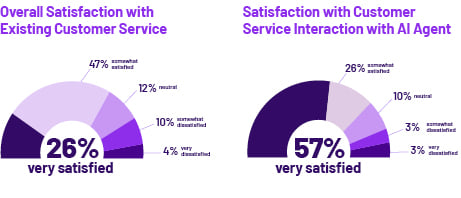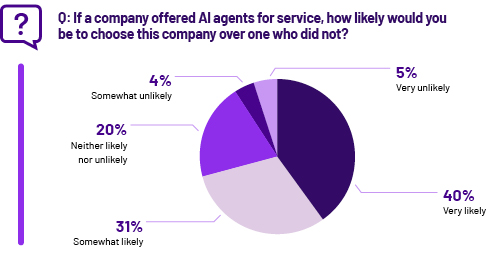Customer service is broken, and most consumers intuitively know it.
According to research SoundHound AI recently commissioned of 1,070 customers across 7 industry verticals, and which was fielded by Big Village Insights, a global research and analytics business, only 26% of respondents reported being very satisfied with current service options.
What was striking in the study was how welcoming consumers were to a new type of automation, AI agents, that are much more friendly and capable than existing customer service automation.
When participants were exposed to AI agent-powered customer service scenarios, such as in banking or hospitality, satisfaction rates more than doubled. Even more striking, more than 2 in 3 consumers said they would choose a company that offered AI agents over a competitor that didn’t.
Read the full research report.
What are AI agents?
AI agents are goal-oriented software entities that can listen, understand, and act, with or without human oversight. Unlike traditional chatbots or virtual assistants, AI agents are built to achieve outcomes, navigating multiple systems to complete tasks end-to-end.
This blog explores what’s broken in customer service today and why AI agents are emerging as a powerful solution.
Why today’s customer service falls short
Customer expectations are at an all-time high, but the tools meant to meet them are falling behind. According to KPMG, customer experience quality dropped 5% in 2023, the lowest since 2015. Most support experiences are still dominated by burdensome IVRs and outdated chatbots, which frustrate customers more than they help them.
Our survey shows that 80% of customers typically abandon automation for human assistance. At an average cost per human interaction of $7, this drives up operations costs through higher staffing needs, employee burnout, and onboarding expenses.
Enter AI agents: a new class of automation
AI agents aren’t just smarter chatbots — they’re a breakthrough technology. These goal-oriented software entities can complete multi-step tasks end-to-end, without human intervention. They understand context, remember past interactions, and can escalate to human agents along with a full history record of the engagement when needed.
To test the impact of AI agents, the survey exposed consumers to simulated service interactions across banking, insurance, and hospitality. The scenarios showed AI agents resolving tasks such as loan management, vacation booking, and claims processing.
The result? “Very satisfied” ratings more than doubled, and consumers described the experience as faster, more effective, and surprisingly human-like.

Satisfaction rates jumped when consumers were exposed to AI agent scenarios.
AI agents vs. human support: achieving parity
In a dramatic shift, 44% of consumers said they would prefer interacting with an AI agent for most service issues — on par with the 41% who still favor human reps.

Consumer openness to AI agents has reached parity with human support.
This opens up a hybrid future where AI agents handle the majority of inquiries and allow human agents to focus on high-empathy or high-stakes situations. The result? Lower costs, reduced burnout, and a more satisfying experience for all.
Customer service as a differentiator
AI agents aren’t just about efficiency; they’re reshaping consumer preferences. 71% of consumers said they’d choose a company offering AI agent support over one that didn’t. That’s a major shift in how customer service influences buying decisions.

AI agents can reshape consumer buying preferences.
After decades of “service as a differentiator” slowly fading into the background, AI agents offer companies a chance to make support a strategic weapon once again.
Get the details in the report
Find out how AI agents are bringing renewed optimism to automation for customer service in our quantitative research paper, AI Takes the Call: Signs of a Customer Service Revolution.

